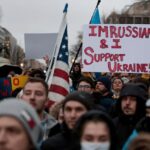Over 150,000 heavily armed Russian troops are stationed near the Ukraine border. Two regions, Donetsk and Luhansk, have declared independence from Ukraine. Violence has broken out, with separatists and government forces blaming one another. Russia has recognized the breakaway regions as independent states and deployed so-called peacekeepers. The U.S., European Union and others have imposed financial sanctions upon Russia, with more on the way. And plans are in the offing to fend off Russian attacks, perhaps militarily. All of this invites the question: Is a peaceful resolution possible?
Each day, odds of agreement grow increasingly remote. Still, should we wish to minimize bloodshed, a useful exercise might be to imagine how the world appears through our adversary’s eyes.
Russia’s president, Vladimir Putin, may be an autocratic nationalist who aspires to restore his country as a global power. However, with respect to Ukraine, he arguably is less an imperialist aggressor than a typical politician engaging in “realpolitik.” As such, he shares more than we’d like to think with our own leaders, past and even present.
Putin’s core demand throughout this saga has been a pledge to bar Ukraine from NATO membership. He sees hostile, well-armed troops encroaching on his borders and regards such actions as an existential menace. Although he denies an intent to attack Ukraine, his troops seem poised to launch a full-scale invasion. Before growing overly incensed, however, let’s consider how we have responded to potentially hostile military build-ups near (and sometimes not so near) our borders.
In the 1840s, we seized most of our southwestern states by force from Mexico. Hawaii was an independent kingdom until a US-backed coup in 1893. In 1898, thanks to the Spanish-American War, we took control of Puerto Rico, Cuba, the Philippines and Guam. In 1983, President Reagan sent troops to topple a socialist government in the Caribbean nation of Grenada. He armed the Contras in an effort to oust Nicaragua’s Sandinista government. And we intervened in Vietnam, Iraq and elsewhere despite little direct threat to the U.S.
The closest analogue to Russia’s actions in Ukraine may be the 1962 Cuban Missile Crisis. Following the CIA-backed Bay of Pigs invasion, Cuba felt under threat and allowed the Soviet Union to place nuclear missiles on its soil, just 90 miles from Florida. President Kennedy perceived those missiles as a mortal danger and prepared for action that could well have led to all-out war. At length, the USSR removed its missiles on the understanding that the US would eliminate its nuclear weapons from bases in Turkey. Catastrophe was averted, but our threats appeared as ominous to Cuba and the Soviets as Russia’s current actions do to Ukraine.
Separatists in the mostly Russian-speaking eastern regions have been fighting on and off with Ukraine’s government since 2014. On Tuesday, Russia recognized those regions as independent states, and Putin sent in troops, allegedly to maintain peace. Russian forces also are engaging in joint exercises with their ally, Belarus. At the time of this writing, they have not invaded hostile territory. Nonetheless, last week Secretary of State Antony Blinken, advised Putin to pull his troops from Ukraine’s border and return them to their bases elsewhere in the country. Consider how we would respond if Putin told us where within the U.S. we must place our troops, or to which allies they could be dispatched.
Putin’s critics highlight a disturbing history. Russia, they point out, illegally invaded Ukraine and annexed Crimea just eight years ago. But once again reality is complicated. Most Crimeans (like a large proportion of Donetsk’s and Luhansk’s population) are ethnically Russian. They believed themselves, their culture, and their language to be under attack. They held a referendum, and even skeptical outsiders acknowledged that an overwhelming majority voted to join Russia.
Is secession by a group that feels itself mistreated an appropriate response? Perhaps not. After all, the U.S. fought a civil war to keep our nation whole. On the other hand, our country only came into existence after leaving England. Furthermore, in recent decades, many in the U.S. sympathized with East Timor’s secession from Indonesia, Eritrea’s departure from Ethiopia, and South Sudan declaring independence from Sudan —actions oft described as self-determination.
Viewed in this light, it is not beyond the pale for Russia to insist on a commitment to keep Ukraine out of NATO. Surely there are other ways to safeguard Ukrainian sovereignty. The West might even use such a concession for diplomatic leverage, justifiably demanding a reciprocal commitment from Putin. If flexibility forestalls the risk of military confrontation and, perhaps, nuclear war, it seems well worth the compromise.
Rick Feinberg is professor emeritus of anthropology at Kent State University.


This article originally appeared on Akron Beacon Journal: Opinion: Consider how Russian President Putin views world




